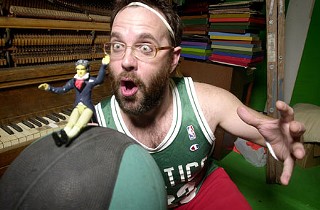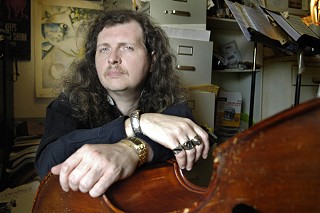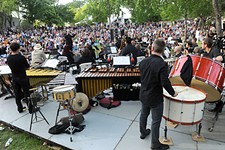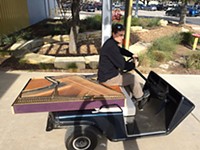Outside the Bachs
Classical sounds new when Austin artists do the composing
By Robert Faires, Fri., May 1, 2009
Where does it all come from? Certainly, some credit is due the composition division at the University of Texas' Butler School of Music, where faculty composers Dan Welcher, Donald Grantham, Russell Pinkston, Bruce Pennycook, and Yevgeniy Sharlat have been busily producing their own new music even as they've been training young composers to produce theirs. But Austin wouldn't have half the new classical scene it does without the presence of Graham Reynolds, Peter Stopschinski, and P. Kellach Waddle, three composers whose talents are matched only by their prodigious outputs and shared passion for generating classical music that's as vibrant, accessible, and exciting as anything else on Austin's contemporary music scene. Alongside them are many other composers – Kathryn Mishell, Travis Weller, Rick Reed, William Meadows, James D. Norman, Brian Satterwhite, and Steve Bernal, to name a few – and groups such as the New Music Co-op, Audio Inversions, and the Austin Museum of Digital Art that work to keep locally generated new music being heard all the time.
Case in point: This weekend, the Austin Symphony premieres Dan Welcher's new symphony, while the Fusebox Festival premieres a site-specific chamber work by the Golden Hornet Project team of Reynolds and Stopschinski. And in two weeks, the Austin Chamber Ensemble will premiere Pulitzer Prize nominee Waddle's latest opus. What better time to start familiarizing yourself with Austin's 21st century counterparts to the Killer Bs – and to hear why their music is worth listening to?
Dan Welcher

The godfather of new music in Austin. Upon arriving here, Welcher founded the New Music Ensemble in UT's School of Music and has devoted three decades to programming works by contemporary composers, including his composition students and composers on the UT faculty. All the while, he's been a most active composer himself, with more than 80 musical works to his credit, everything from symphony to opera, art song to piano solo. And those works have been performed by more than 50 orchestras. He is also the host of a weekly radio series, Knowing the Score (Sunday, 8pm, on KMFA 89.5FM).
Recent Premieres: Four Personal Ads (song suite, premiered July 11, 2008; Austin Chamber Music Center); You Can Fool ... (percussion quintet, premiered March 14; Percussion Galore! in Round Top); Four More Personal Ads (song suite, premiered April 29; Georgia State University).
Coming Up: Symphony No. 5, commissioned by the Austin Symphony Orchestra, premiering May 1 & 2, 8pm, at the Long Center for the Performing Arts.
Welcher: "My Symphony No. 5 is one of the biggest orchestral projects I've ever had and one of the few where everything was left completely up to me. That's why there's no subtitle and no 'storyline,' except for the fact that the Scherzo (second movement) was inspired by watching the Congress Avenue bat flight. This is a four-movement, 38-minute flesh-and-blood symphony, in every sense of that word: There are themes that recur between movements; there is Big Emotion within a traditionally serious symphonic structure (not unlike that of Shostakovich or Sibelius); and at the end of the piece, the audience should feel a rush and a sense of having been on a real journey. It's like reading a contemporary novel, with characters, plot twists, and lots of atmosphere."
Peter Stopschinski
After establishing his rock bona fides in the Nineties band Brown Whörnet, Stopschinski began allowing his classical side to show, first through original scores to silent films (Nosferatu, The Lost World, The Gold Rush, et al.), then through string quartets, symphonies, concertos, works for brass and percussion ensembles, choral works, dance scores, you name it. For 10 years, he and Graham Reynolds have headed the Golden Hornet Project as a vehicle for their composing works. Stopschinski teaches composition at the Austin Chamber Music Center and is resident composer at the Austin Waldorf School, where he wrote the cantata The Darkest Things Sing.
Recent Premieres: "A Cuckoo Clock in Hell": Description of an Insane Mind From Mother Night, by Kurt Vonnegut (cello/bass duet, premiered Nov. 8, 2008; Alamo Drafthouse Lake Creek); I've Never Been So Happy (workshop I) (musical score, book and lyrics by Kirk Lynn; premiered Dec. 4-13, 2008, Rude Mechs).
Coming Up: PVC Surround, for violin, cello, and piano, composed with Graham Reynolds; premiering Saturday, May 2, 2 & 5pm, in the lobby at 100 Congress; Symphony No. 6, premiering Sept. 26 (Golden Hornet Project); A Tale of Two Cities, premiering November (Austin Waldorf School).
Stopschinski: "This November I will be premiering a new musical adaptation of Charles Dickens' A Tale of Two Cities commissioned by the Austin Waldorf School. The script was adapted by Arthur Pittis, a longtime faculty member, and I am writing the music for orchestra, choruses, and many soloists and duets, etc. The high school students all study A Tale of Two Cities, so I have students coming up to me with suggestions: 'Sydney Carton and the seamstress should have a duet,' or, 'Make Madame Defarge really nasty!' Beginning in the fall, the entire high school will spend the second half of each day rehearsing, building the set, designing the lights, sound, etc. They will also gain the unique experience of working with the composer and writer firsthand in the development of a new work.
"This project is really calling on all my skills as a composer. First of all, there are about 30 musical numbers and an extremely large cast so that as many students can have time onstage as possible. Second, the piece is for high school-level performers, so it can't be superhard. Third, the time period of the story requires a more refined musical language than I usually employ, and I am being asked to convey moods and emotions that are a bit of a stretch for me and require much trial and error to combine the old styles of the 18th century with a 21st century musical vocabulary without distracting from the tale."
Graham Reynolds
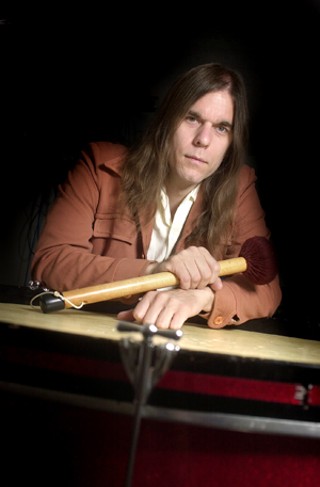
Soft-spoken and self-effacing, Reynolds' low-key demeanor doesn't prepare you for the intense, propulsive, jazz-energized music he cranks out so quickly and skillfully for the Golden Arm Trio and his other projects. And he's so open and willing to collaborate with anyone that he seems to be everywhere at once: scoring theatre for Salvage Vanguard or the Rude Mechs, scoring dances for Ariel Dance Theatre or Ballet Austin, scoring films for Richard Linklater or Luke Savisky, or writing symphonies, concertos, string quartets, and whatnot for the Golden Hornet Project, the musical vehicle he developed with colleague Peter Stopschinski 10 years ago.
Recent Premieres: Three Very Short Pieces for Kurt Vonnegut (cello/bass duet, premiered Nov. 8, 2008, Alamo Drafthouse Lake Creek); Whale Drum (premiered April 14, UT Percussion Ensemble); A Piece for Fifty Drummers (premiered April 23, Fusebox Festival); Between Steel and Stardust (Songs of Texas Women) (song suite, lyrics by Carrie Fountain; premiered April 26, Butler School of Music); Double Double: A Suite for Oboe, Bassoon, and Piano (premiered April 26, Butler School of Music).
Coming Up: PVC Surround, for violin, cello, and piano, composed with Peter Stopschinski; premiering Saturday, May 2, 2 & 5pm, in the lobby at 100 Congress; Trash Project, score for a choreographed fleet of 20 trash trucks and sanitation workers with samples of Austin Solid Waste Services machinery, trucks, and people, plus a live trio of piano, violin, and cello, premiering Sept. 12 (Forklift Danceworks); Symphony No. 6, premiering Sept. 26 (Golden Hornet Project).
Reynolds: "It's impossible to say how long my symphonies or other long-term compositions like my Golden Arm Trio albums take to compose. Really, I start thinking about them as soon as the previous effort is complete. Every project I do in between feeds into and serves these larger pieces that provide a chance to synthesize the vocabulary and ideas I've been working on. With every theatre or film score, chamber-music concert, or club show, I try to explore something I'm not completely comfortable with, whether it's a specific scale I'm interested in at the time or software that I'm new to or an instrument that I'm trying to understand more, in order to push myself, learn something, and stay fresh. In that way, my myriad projects overlap and support one another, as it's less like starting completely from scratch, and hopefully that results in a better end product for each. For the symphony, I might take a theme from a Rude Mechs play for one section, a riff from the ballet Cult of Color for another, and a drum beat from my UT Percussion Ensemble piece for a third. For other sections, the material will be completely new. The hope is that with the overlap in vocabulary, they won't feel like disparate ideas pasted together but rather an extended conversation consolidated into one statement. At least that's the idea. We'll know whether it works come September."
P. Kellach Waddle
A whirlwind of composition who generates music the way you or I sneeze, Waddle already boasts close to 300 works on his résumé and may produce another 20 or so before 2009 is out. And in his case, quantity and quality play a sweet duet: Twice he's had music nominated for the Pulitzer Prize. In Austin, Waddle has made a mission of accessibility, creating the Music and a Movie series at the Alamo Drafthouse, the Library Concert series through the Austin Public Libraries, and the Synthesis of Music and Literature series at BookPeople. In addition, he plays bass with the Austin Symphony and is a published author and a serious blackjack dealer.
Recent Premieres: The Mist in the September Wine (solo for violin, premiered Sept. 30, 2008, Jessica Mathaes for Round Rock Symphony Orchestra); A Vonnegut Quintet: String Quintet No. 5 in Three Movements; Cereal Music: Sonatina for Bass and Harp; Romeo and Juliet and All Music Is Sacred: Homage to Prokofieff, Messaien, Berlioz, and Vonnegut for Solo Bass; and Espionage Whore: For Bass and Violin (premiered Nov. 8, 2008, Alamo Drafthouse Lake Creek); Your Midnight Blue Lies (solo for viola; premiered Jan. 23, Viola by Choice/Audio Inversions).
Coming Up: Of Cleaning; and From Off the Tree; and Dream Visions: Trio in Form of Four Surreal Still Lifes, commissioned by the Austin Chamber Ensemble, premiering Thursday, May 14, Westlake United Methodist Church, 1460 Redbud Trail, and Friday, May 15, First Presbyterian Church, 8001 Mesa; Welcome Simone, Now Please Go to Sleep: Lullaby for Solo Bass, premiering September, São Paulo, Brazil.
Waddle: "Since I write so many short or medium-length pieces, a 40-minute, four-movement work was obviously a different undertaking. Definitely not like many of my solo instrument works that I often write in four to six hours! This piece is also much more dramatically surreal, with my still-tonal-based harmony going to even further boundaries of said harmony in order to create a bit of a different sound world.
"Writing for winds is always a challenge because as a string player, I am using all the chords and double stops for richness and added colors. For wind parts, this isn't practical so I have to strive to make the material just as interesting without having that technique at my disposal. Plus, these pesky wind folk have to breathe! The bow can create an endless, unstopped sound. Even the most virtuosic circular breathers cannot completely duplicate that. Also, I am not a pianist. (Just like Berlioz and Wagner weren't.) So to also write effectively for the keyboard without its ability to alter the sound once it's struck (no varying colors of vibrato or bow speed alterations to vary the color of the sound after it's heard) is always a challenge for me. Thankfully, I was writing two clarinet/violin/piano trios at once during this time. When it's something out of my usual vein, I always find writing more than one of a certain instrumentation of a piece is always a help and assists in getting inside the sound world of said given instrumentation.
"The biggest bummer for this piece? I can't go to the premieres! I'm playing with the Austin Symphony during the ACE concerts. Part of the double-edged sword of being such an active player outside my composition life."





